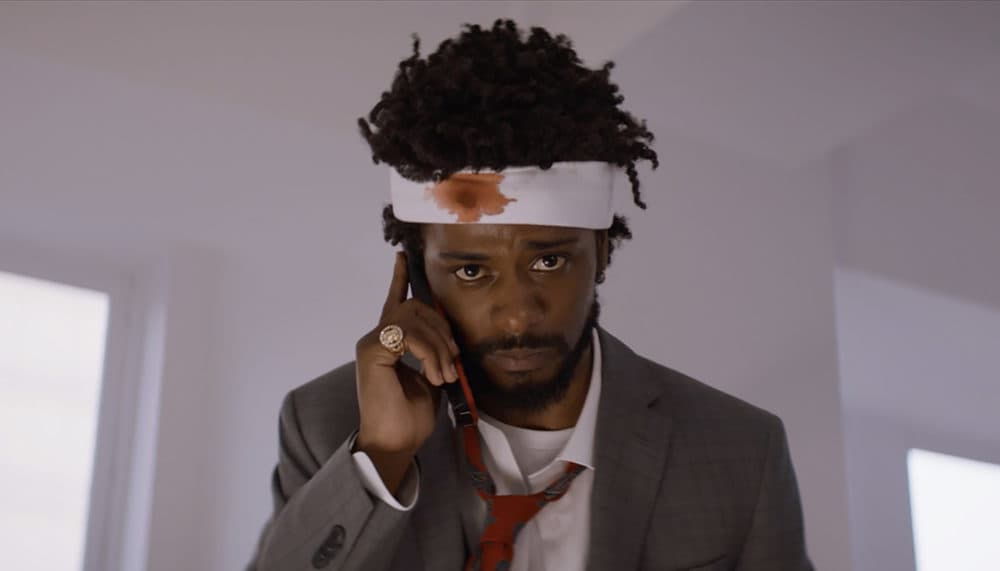Advertisement
Commentary
What The Surreal Twist Ending Of 'Sorry To Bother You' Says About America Today

Warning: This essay obviously contains spoilers from "Sorry To Bother You."
The daredevil spirit of “Sorry to Bother You,” Boots Riley’s deranged anti-capitalist romp, reveals itself with a thunk. Our hero, Cassius Green, aka Cash, has just started a job selling encyclopedias at a telemarketing company called RegalView. Slouched at one among a drab sea of cubicles, he tentatively places his first call — and, with a rumble, drops, desk and all, through the floor and into the kitchen of his first mark.
The visual gambit serves to highlight the crass invasiveness of Cash’s new gig — not to mention its pointlessness. In this day and age, who needs a full set of encyclopedias? Not the man whom Cash calls up during breakfast, nor the couple having sex, and certainly not the elderly lady who confides that her husband is in the hospital, on death’s brink. Cash, played with wary tautness by Lakeith Stanfield, pauses, seized by the twin reflexes of sympathy and terror familiar to anyone suddenly confronted with a stranger’s grief. But, exhorted by his bosses to always “stick to the script,” he forges onward, and attempts to convert a tragedy into a sale. With a disgusted sob, the woman hangs up.
Cash’s fortunes soon begin to turn, and he finds himself ascending the RegalView ranks just as his coworkers make a bid to unionize. (His telemarketing success is thanks to the discovery of his “white voice,” zanily portrayed by an overdubbed David Cross.) While his former friends demonstrate in front of RegalView’s Oakland offices, Cash crosses the picket line and rides a golden elevator to the industrial-chic suites of the company’s “power callers,” who collect exorbitant salaries hawking weapons and slave labor to international governments and tycoons.
As things progress, Riley ratchets up the movie’s trademark surrealism, which culminates in a plot twist so bizarre that it’s not worth spoiling if you haven't seen it yet. So, take a moment, consider your options and, you know, don’t get mad at me if what comes next ruins the movie for you.
One of RegalView’s biggest clients is WorryFree, an Amazon-like corporation whose workers forfeit wages for room, board and (mandatory) lifetime employment — slavery, rebranded. At a WorryFree corporate bacchanal, Cash discovers that the company’s CEO Steve Lift — a boyishly ruthless Armie Hammer — has secretly developed a gene-altering drug that he plans to use to transform his workers into ultra-efficient horse-human hybrids, a few of which he keeps chained up in the basement of his mansion. The campy revelation — the Equisapiens, as they’re known, are rendered in cartoonish CGI — lands with the shock of a horror flick and the glee of a punchline, and the creeping terror of Riley’s satirical dystopia is suddenly laid bare.
The film concludes by teasing a happy ending, before warping into something much darker. A redeemed Cash moves back in with his girlfriend, Detroit (an excellent Tessa Thompson), after having aided in the workers’ successful effort to unionize, with plans to return to his old job at RegalView. Riley casts the penultimate sequence in a dreamy glow, as Cash and Detroit prepare to enter an idyllic future together. But this hopeful vision is quickly punctured. Cash, it turns out, was unwittingly dosed with the transmogrifying horse dope, and a horrified Detroit watches as her lover mutates before her eyes. We catch our final glimpse of Cash as he leads an Equisapien assault on Steve Lift’s gated home, intent on revenge. Horror, it seems, wins out over hope.
Or does it? “Sorry to Bother You” exposes the depravities of consumer capitalism, its insidious, corrupting influence, so thoroughly as to represent a system beyond repair. Maybe labor reform isn't enough; maybe we need the horse people to foment a revolution. Strange as such a vision may be, stranger in some ways is the alternative: the same pointless job as before, but now with benefits. It's hard to imagine Cash back at his old desk, bursting into the lives of strangers in order to push useless products, another cog in a stifling, profit-driven machine. That image contains a horror of its own.


